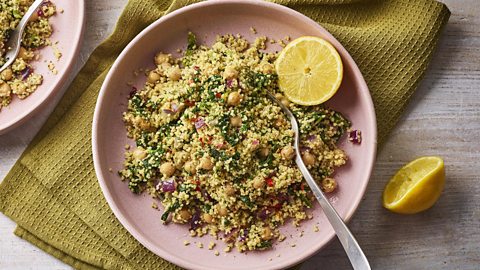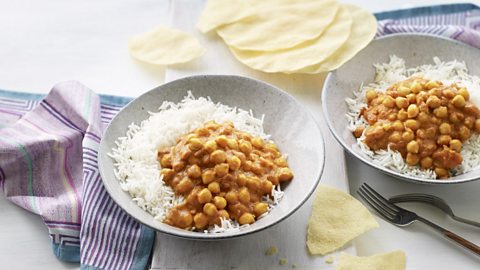Frozen, tinned or fresh: Which foods are better for you?
It’s often viewed as second best but can frozen and tinned food be as nutritious as fresh? Here’s what the evidence suggests…
By Sue Quinn

As the cost-of-living crisis continues, there’s more demand for tasty but inexpensive ingredients. And, with health experts advising we eat 30 different plants per week, variety is a priority for many too.
According to research firm Kantar, last year, British consumers bought 15% more frozen food than the year before, with sales increasing for frozen ingredients including fruit and vegetables, poultry and fish.
“Many consumers are looking for foods that won't perish before they can cook them,” says Rupert Ashby, chief executive of the British Frozen Food Federation (BFFF).
After a surge during lockdown, canned food sales are now back to pre-pandemic levels, according to a recent survey by trade magazine, The Grocer. However, the popularity of certain brands of canned vegetables, including tomatoes, is rising.
What’s healthier fresh, tinned, or frozen fruit and veg?
Some people have previously avoided tinned and frozen produce because they’re technically classed as ‘processed’, but this is unnecessary, says Professor Keshavan Niranjan, food and nutritional sciences department, University of Reading.
“By the time so-called fresh food reaches the supermarket, then gets to us and we consume it, there can be quite a time lag,” he says.
Fruit and vegetables start to lose nutrients as soon as they’re picked. The water soluble vitamins they contain, especially C and B, are particularly susceptible to damage from heat, light and oxygen.
Studies have found some frozen fruits and vegetables contain more of certain nutrients than those stored at room temperature or in the fridge for several days. One study found spinach, loses 100% of its vitamin C if stored at room temperature for a week, 75% if refrigerated but just 30% if frozen.
Green peas, broccoli and beans lose about half of their vitamin C within the first two days after harvest, Niranjan says. “But freezing stops this in its tracks.”
Couscous with spinach and chickpeas
This recipe uses tinned chickpeas and frozen spinach to great effect

“I would say frozen food is fresher in many cases than so-called ‘fresh’ food,” he says.
Likewise, with tinned food, most fruit and vegetables are canned within four hours of picking, says the Association of European Producers of Steel for Packaging (Apeal).
Once sealed inside the tin, food is heated to a high temperature to sterilise it and kill potentially harmful bacteria. This process also preserves nutrients, says Steve Claus, Apeal’s secretary general.
But the evidence is mixed, making it hard to know whether tinned vegetables are just as nutritious as fresh. For example, some studies highlight there may be less water soluble vitamins including B and C in tinned vegetables due to the heating process than fresh or frozen.
There’s also some evidence which suggests there's a loss of nutrients when pulses are tinned rather than prepared in the home from dried.
However, there's also evidence that the canning process could actually boost other nutrients – for example, tinned tomatoes could be higher in magnesium and the antioxidant, lycopene than you’d find in fresh.
5-ingredient chickpea coconut curry
Two of the five ingredients in this dish are tinned

How to maximise the health benefits of tinned and frozen fruit and veg
Nutritionist Aliya Porter shares her tips for boosting the nutritional content of tinned fruit and vegetables:
Mix varieties
Porter suggests mixing baked beans, with a can of different beans (such as borlotti or aduki). “This will give you more variety and reduce the salt and sugar.”
Watch the fibre content
If the skin's removed from tinned fruit it will contain less fibre, “try to include frozen or fresh fruit in your diet too.”
Check the label
Choose fruit that is in juice instead of syrup, and vegetables that are in plain water, without added salt.
Cook less
Remember frozen vegetables are already blanched and don’t need to be cooked for as long, says Porter, adding: “The more time you heat them the more vitamins are lost, so quick heating is key.”
Use canned beans and pulses to make nutritious dinners like these
What’s cheaper fresh, frozen or tinned?
Frozen and tinned fruits and vegetables are generally cheaper than their ‘fresh’ equivalents because less waste is involved in getting them from field to plate, says Niranjan.
Fresh produce often travels long distances by road or air, sometimes becoming damaged in the process and can end up stored in warehouses or supermarket shelves for so long it spoils.
“With frozen and canned products, the shelf life is long and manufacturers can control the whole process.”
There are more options now too, including produce that’s ordinarily expensive when fresh, as well as hard-to-source ingredient. For example, you can now find bags of frozen avocado and tins of banana blossom and jackfruit.
What’s better for texture fresh, frozen or tinned?
Fresh is often seen as superior to tinned because the canning process can change the texture and appearance of ingredients, making them softer. “The canning process is intense and designed to make the products last a long time,” Niranjan says. “Because the temperatures are high and the food stays hot for some time, some products can be overcooked.”
Likewise, some people find the texture of frozen meat and certain types of seafood – for example, fish with delicate flesh – inferior to fresh. Niranjan says this happens because the ice crystals that form during freezing can damage the cells in food, which changes its structure. “And this can’t be undone,” he says.
That said, some frozen foods, such as octopus, are better after freezing because it tenderises the flesh.
How to cook with frozen and tinned ingredients
From veg to meat, here's how you can get the most out of frozen and tinned ingredients.
Plant-based
Frozen vegetables can be used in a like-for-like way to fresh, just refer to cooking instructions.
As for tinned options, tomatoes, lentils and beans are chef Theo Michaels’ favourites. Author of the cookbook Canned, he points out their versatility.
“If I’m going to make a bolognese sauce, I’ll swap out half the beef mince with tinned puy or green lentils. It’s a great way to reduce your meat intake and your costs.”
Another idea is to simmer together tinned white beans, tinned tomatoes, spices, a pinch of salt and a pinch of sugar. “You’ve got a lovely base to serve with roasted fish, meat or vegetables,” says the expert.
Tinned stone fruit like peaches and apricots, pears and frozen berries are excellent in cooked puddings like crumbles and compotes but also delicious spooned over yoghurt and cereal.
Crumble's always popular and this pear, apple and ginger one uses tinned fruit
These dishes make frozen fruit and veg the star of the show
Tinned and frozen seafood
Tinned seafood is frequently cheaper then fresh and there’s a surprisingly wide range available. It’s even been given a social media makeover with people filming themselves having tinned fish date nights.
Michaels suggests making a pasta sauce by simmering together tinned tomatoes, smoked mussels and octopus.
As for frozen bags of seafood, fish and prawns work very well in stews, curries, pies and fish cakes.
You can use frozen and tinned fish in these delicious dishes
Frozen meat
Though the texture can differ from fresh, frozen meat still makes delicious and affordable meals.
Frozen diced beef and lamb are ideal for long, slow cooking in stews and curries. Often, beef and lamb can be cooked straight from frozen, but check the instructions on the label to be sure.
These recipes use frozen meat to their advantage
As with everything to do with taste and texture, it's all down to individual preference. It's likely you'll prefer some ingredients fresh, others frozen or tinned. So experiment and see what's right for you.
Originally published April 2024